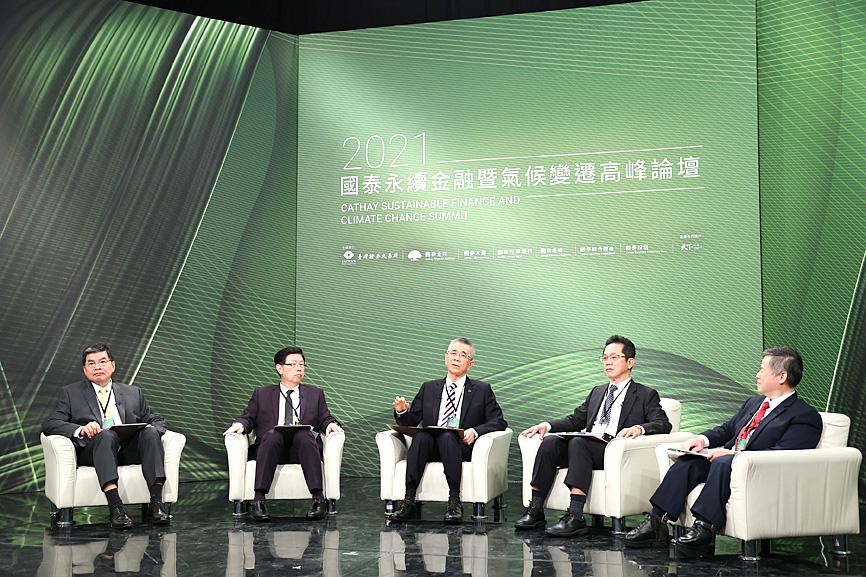Hon Hai Precision Industry Co (鴻海精密) is to put environmental, social and corporate governance (ESG) considerations into each employee’s key performance indicators, Hon Hai chairman Young Liu (劉揚偉) said at a forum for sustainable finance and climate change yesterday.
In addition, the company would earmark 1 percent of its research and development budget to ESG initiatives, Liu said.
Hon Hai’s research and development budget is about NT$200 billion (US$7.2 billion) annually, meaning the ESG budget would be about NT$2 billion per year.

Photo courtesy of Sinyi Realty Inc
ESG would be an integral part of Hon Hai’s strategy going forward, Liu said, adding that climate change is the most pressing concern behind its drive.
“Extreme climate is a threat to the lives and properties of people all over the world,” Liu said. “Without a market, there is no enterprise.”
Hon Hai last year made a commitment to reach net zero carbon emissions by 2050, but some of the firm’s biggest clients have a more aggressive goal of reaching net zero by 2030, he said.
To reach its goal, Hon Hai is a part of the Carbon Disclosure Plan and has set up committees to reduce emissions and inspect the carbon footprints of its suppliers.
“We hope that ESG is not just a matter of spending money, but encouraging people to feel a sense of pride and participation in making the world a better place,” Liu said.

Stephen Garrett, a 27-year-old graduate student, always thought he would study in China, but first the country’s restrictive COVID-19 policies made it nearly impossible and now he has other concerns. The cost is one deterrent, but Garrett is more worried about restrictions on academic freedom and the personal risk of being stranded in China. He is not alone. Only about 700 American students are studying at Chinese universities, down from a peak of nearly 25,000 a decade ago, while there are nearly 300,000 Chinese students at US schools. Some young Americans are discouraged from investing their time in China by what they see

Taiwan Transport and Storage Corp (TTS, 台灣通運倉儲) yesterday unveiled its first electric tractor unit — manufactured by Volvo Trucks — in a ceremony in Taipei, and said the unit would soon be used to transport cement produced by Taiwan Cement Corp (TCC, 台灣水泥). Both TTS and TCC belong to TCC International Holdings Ltd (台泥國際集團). With the electric tractor unit, the Taipei-based cement firm would become the first in Taiwan to use electric vehicles to transport construction materials. TTS chairman Koo Kung-yi (辜公怡), Volvo Trucks vice president of sales and marketing Johan Selven, TCC president Roman Cheng (程耀輝) and Taikoo Motors Group

MAJOR DROP: CEO Tim Cook, who is visiting Hanoi, pledged the firm was committed to Vietnam after its smartphone shipments declined 9.6% annually in the first quarter Apple Inc yesterday said it would increase spending on suppliers in Vietnam, a key production hub, as CEO Tim Cook arrived in the country for a two-day visit. The iPhone maker announced the news in a statement on its Web site, but gave no details of how much it would spend or where the money would go. Cook is expected to meet programmers, content creators and students during his visit, online newspaper VnExpress reported. The visit comes as US President Joe Biden’s administration seeks to ramp up Vietnam’s role in the global tech supply chain to reduce the US’ dependence on China. Images on

New apartments in Taiwan’s major cities are getting smaller, while old apartments are increasingly occupied by older people, many of whom live alone, government data showed. The phenomenon has to do with sharpening unaffordable property prices and an aging population, property brokers said. Apartments with one bedroom that are two years old or older have gained a noticeable presence in the nation’s six special municipalities as well as Hsinchu county and city in the past five years, Evertrust Rehouse Co (永慶房產集團) found, citing data from the government’s real-price transaction platform. In Taipei, apartments with one bedroom accounted for 19 percent of deals last